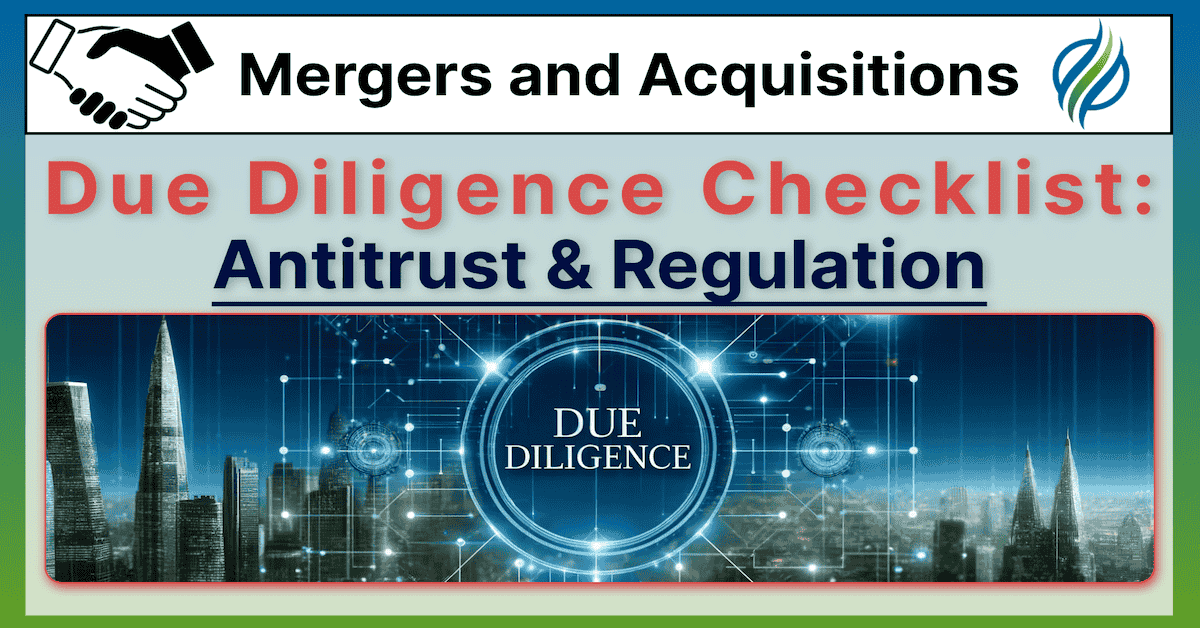Navigating antitrust and regulatory issues in mergers and acquisitions can be daunting.
This guide breaks down the complexities, helping you understand and comply with crucial laws.
It’s essential for avoiding legal hurdles and ensuring a smooth acquisition process.
By reading this, you’ll gain practical steps, learn the importance of each aspect, and discover valuable resources.
 Key Takeaways
Key Takeaways
- Evaluate antitrust issues to ensure your acquisition complies with competition laws and avoids legal challenges.
- Understand necessary regulatory approvals to prevent delays and ensure a smooth acquisition process.
- Review past regulatory inquiries of the target company to identify potential risks and compliance issues.
- Prepare for Hart-Scott-Rodino filing if thresholds are met to comply with pre-merger notification requirements.
- Assess national security and foreign investment concerns to address potential legal and operational obstacles.
To get the most out of this guide, take your time with each section.
Reflect on the self-assessment questions.
Use the provided resources to dive deeper.
Ready to master M&A compliance?
Keep reading to equip yourself with the knowledge you need for successful acquisitions.
 Table of Contents
Table of Contents
Antitrust and regulatory scrutiny of acquisitions has been increasing in recent years.
As mergers and acquisitions (M&A) become more prevalent, ensuring compliance with antitrust laws and regulatory requirements is crucial.
Regulatory bodies are increasingly vigilant, aiming to prevent monopolistic practices and maintain competitive markets.
Failing to consider these aspects can lead to significant legal challenges, delays, or even the cancellation of a deal.
Therefore, thoroughly understanding and navigating the antitrust and regulatory landscape is essential for a successful acquisition.

➤ MORE: Check out the FULL Due Diligence Checklist here
Analyze Scope of Antitrust Issues
Evaluating whether the acquisition might raise antitrust concerns is a fundamental step in the M&A due diligence process.
This assessment helps ensure that the deal complies with antitrust laws and regulations, thereby avoiding potential legal pitfalls and ensuring a smoother transaction.
Benefits:
-
Identifies potential red flags early, mitigating risks.
-
Facilitates a more efficient approval process.
-
Helps in structuring the deal to comply with antitrust regulations.
Importance:
Understanding the scope of antitrust issues is critical to prevent the deal from facing legal challenges, fines, or rejection by regulatory authorities.
It ensures that the acquisition does not create a monopoly or reduce competition in the market, which could lead to severe penalties.
Practical Steps:
-
Identify Relevant Markets: Determine the markets in which both companies operate to understand the competitive landscape.
-
Assess Market Shares: Calculate the market shares of the companies involved to evaluate the impact on market competition.
-
Review Antitrust Laws: Understand the antitrust laws relevant to the jurisdictions involved in the deal.
-
Consult Legal Experts: Engage with legal advisors specializing in antitrust law to assess potential concerns.
Self-Assessment Questions:
-
Does the acquisition involve competitors or potential competitors?
-
Could the deal create a monopoly or reduce competition in any market?
-
What are the relevant market shares of the companies involved?
-
Are there any past antitrust issues related to the companies?
Resources:
-
Legal Advisors specializing in antitrust law
Review Regulatory Approvals Required
Determining if the target company operates in a regulated industry requiring acquisition approval from regulatory bodies is vital.
This helps identify necessary steps for regulatory compliance and ensures that the acquisition proceeds without regulatory hitches.
Benefits:
-
Ensures compliance with industry-specific regulations.
-
Avoids delays caused by regulatory non-compliance.
-
Helps in planning the acquisition timeline accurately.
Importance: Regulatory approvals are mandatory for acquisitions in regulated industries such as finance, healthcare, and telecommunications.
Failure to secure these approvals can result in the transaction being delayed or blocked entirely, leading to financial and reputational damage.
Practical Steps:
-
Identify Regulated Industries: Determine if the target company operates in a regulated industry that requires specific approvals.
-
Research Regulatory Requirements: Understand the specific regulatory requirements and approvals needed for the acquisition.
-
Engage with Regulators: Initiate early communication with regulatory bodies to understand their requirements and expectations.
-
Prepare Documentation: Gather and prepare all necessary documentation required for regulatory filings.
Self-Assessment Questions:
-
Does the target company operate in a regulated industry?
-
What regulatory approvals are required for the acquisition?
-
What is the process and timeline for obtaining these approvals?
Resources:
-
Legal Advisors specializing in regulatory compliance
Evaluate Past Antitrust or Regulatory Inquiries
Reviewing any past antitrust or regulatory inquiries involving the target company helps assess the company’s regulatory compliance history and potential risks.
This step is crucial for understanding any existing legal issues that might impact the acquisition.
Benefits:
-
Provides insights into the company’s compliance history.
-
Identifies potential risks and unresolved issues.
-
Informs decision-making regarding the acquisition.
Importance:
Evaluating past inquiries is essential to identify any patterns of non-compliance or regulatory challenges that the target company may have faced.
This knowledge can influence the structure and terms of the acquisition to mitigate potential risks.
Practical Steps:
-
Obtain Inquiry Records: Request records of any past antitrust or regulatory inquiries from the target company.
-
Analyze Inquiry Outcomes: Review the outcomes of these inquiries to understand the severity and implications.
-
Assess Remedial Actions: Evaluate the measures taken by the target company to address issues identified in past inquiries.
-
Consult Legal Experts: Work with legal advisors to interpret the findings and their impact on the acquisition.
Self-Assessment Questions:
-
Has the target company been involved in any past antitrust or regulatory inquiries?
-
What were the outcomes of these inquiries?
-
How has the company addressed any issues identified in the inquiries?
Resources:
-
Legal Advisors specializing in regulatory inquiries
Prepare for Hart-Scott-Rodino Filing
If thresholds are met, preparing for a Hart-Scott-Rodino (HSR) filing and effectively responding to any “second request” from the Department of Justice or Federal Trade Commission is essential.
This ensures compliance with pre-merger notification requirements in the United States.
Benefits:
-
Ensures compliance with HSR requirements.
-
Facilitates a smoother review process by regulatory bodies.
-
Reduces the risk of delays or penalties.
Importance:
The HSR filing is a critical step in the acquisition process for deals that meet certain size thresholds.
Proper preparation and timely filing are necessary to avoid fines and delays.
Practical Steps:
-
Determine HSR Thresholds: Confirm if the acquisition meets the HSR filing thresholds based on the size of the parties and the transaction.
-
Gather Information: Collect all necessary information required for the HSR filing, including financial statements and organizational details.
-
Prepare Filing Documents: Complete the HSR filing documents accurately and thoroughly.
-
Submit Filing: Submit the HSR filing to the Federal Trade Commission and Department of Justice.
-
Respond to Second Requests: If a second request for information is issued, promptly gather and submit the required additional information.
Self-Assessment Questions:
-
Does the acquisition meet the thresholds for HSR filing?
-
What information is required for the HSR filing?
-
What is the process for responding to a “second request”?
-
Are there any potential issues that could arise during the HSR review?
Resources:
Consider National Security or Foreign Investment Issues
Evaluating any national security or foreign investment issues that might impact the acquisition, such as Exon-Florio concerns, is essential.
This ensures that the acquisition complies with national security regulations and addresses any foreign investment concerns.
Benefits:
-
Ensures compliance with national security and foreign investment regulations.
-
Reduces the risk of the deal being blocked or delayed by regulatory authorities.
-
Protects the strategic interests of the acquiring company.
Importance:
National security and foreign investment issues can significantly impact the feasibility and timing of an acquisition.
Ensuring compliance with relevant regulations helps in avoiding potential legal and operational obstacles.
Practical Steps:
-
Identify National Security Concerns: Determine if the acquisition involves any national security-sensitive assets or operations.
-
Assess Foreign Investment Regulations: Understand the foreign investment regulations applicable to the jurisdictions involved.
-
Engage with Regulatory Bodies: Initiate early discussions with national security and foreign investment regulatory bodies.
-
Prepare Compliance Documentation: Gather and prepare all necessary documentation required for compliance with national security and foreign investment regulations.
Self-Assessment Questions:
-
Does the acquisition involve any national security concerns?
-
Are there any foreign investment issues that need to be addressed?
-
What is the process for obtaining necessary approvals for these issues?
-
Are there any potential risks related to national security or foreign investment?
-
How significant are these issues in the context of the acquisition?
Resources:
-
Committee on Foreign Investment in the United States (CFIUS)
-
Legal Advisors specializing in national security and foreign investment law
FAQs - Frequently Asked Questions About Antitrust Laws and Regulation in the M&A Due Diligence Process

What are antitrust issues in M&A?
Antitrust issues in M&A involve potential monopolies and reduced competition.
Learn More...
Antitrust issues in mergers and acquisitions focus on preventing monopolistic practices and ensuring healthy market competition.
Regulatory bodies like the FTC and DOJ evaluate the impact of mergers on market dynamics.
They scrutinize aspects such as market share, competitive overlap, and the potential for creating monopolies.
Addressing these concerns early in the due diligence process can help avoid legal challenges and ensure a smoother transaction.
Why is regulatory approval important in M&A?
Regulatory approval ensures legal compliance and smooths the acquisition process.
Learn More...
Regulatory approval is crucial in M&A because it ensures that the transaction complies with industry-specific laws and regulations.
For instance, acquisitions in industries like finance or healthcare often require clearance from relevant regulatory bodies.
Without these approvals, the acquisition could face significant delays, fines, or even be blocked.
Understanding the regulatory landscape and obtaining necessary approvals is key to avoiding these risks and facilitating a successful merger.
How do past regulatory inquiries affect M&A?
They indicate potential compliance issues and risks.
Learn More...
Past regulatory inquiries can significantly impact M&A by highlighting potential compliance issues and risks associated with the target company.
A history of regulatory scrutiny may suggest ongoing compliance challenges or unresolved issues that could affect the viability of the acquisition.
Conducting thorough due diligence on these inquiries helps identify and mitigate these risks, ensuring that the acquiring company is aware of any potential legal or operational hurdles.
What is a Hart-Scott-Rodino filing?
It's a pre-merger notification required by U.S. antitrust law.
Learn More...
The Hart-Scott-Rodino (HSR) filing is a pre-merger notification required by U.S. antitrust law for certain transactions.
It involves submitting detailed information about the merging parties to the FTC and DOJ.
This filing allows regulators to review the transaction for potential antitrust concerns before it is completed.
Proper preparation and submission of HSR filings can prevent delays and ensure that the merger complies with antitrust regulations.
Why assess national security in M&A?
To ensure compliance with laws like Exon-Florio and avoid legal issues.
Learn More...
Assessing national security in M&A is critical to comply with regulations like the Exon-Florio Amendment, which allows the U.S. government to review foreign investments for national security concerns.
This assessment helps identify and address any potential risks associated with the acquisition, such as the transfer of sensitive technologies or critical infrastructure to foreign entities.
Ensuring compliance with these laws protects the acquiring company from legal challenges and ensures the transaction proceeds smoothly.
In Summary…
Understanding antitrust and regulatory issues in mergers and acquisitions is essential for a successful transaction.
This guide provides the tools you need to navigate these complex areas.
By evaluating antitrust concerns, identifying necessary regulatory approvals, reviewing past inquiries, preparing for Hart-Scott-Rodino filings, and assessing national security and foreign investment issues, you can mitigate risks and ensure compliance.
Practical Application:
-
Antitrust Analysis: By thoroughly evaluating potential antitrust issues, you can prevent legal challenges and ensure your deal complies with competition laws.
-
Regulatory Approvals: Understanding and obtaining necessary regulatory approvals helps avoid delays and ensures a smooth acquisition process.
-
Historical Inquiry Review: Reviewing past regulatory inquiries provides insights into potential compliance issues and helps in planning for risk mitigation.
-
HSR Preparation: Preparing for Hart-Scott-Rodino filings ensures you meet pre-merger notification requirements, reducing the risk of fines and delays.
-
National Security & Foreign Investment Assessment: Addressing national security and foreign investment concerns ensures compliance with relevant laws and avoids operational obstacles.
By using the information outlined in this article, you gain a comprehensive understanding of the critical compliance aspects in M&A due diligence.
This knowledge helps you structure deals effectively, avoid legal pitfalls, and ensure a seamless acquisition process.
Ready to take your M&A strategy to the next level?
Schedule a consultation call with our business initiative or reach out using our contact form to get started.
For more insights and updates, subscribe to our Initiative Newsletter and follow us on X.
Sources
- Federal Trade Commission (FTC): For antitrust information.
- Department of Justice (DOJ): For regulatory compliance information.
- Industry Regulatory Bodies: Relevant to the target company’s industry.
- Department of Justice (DOJ) Antitrust Division: For antitrust and regulatory inquiries.
- Federal Trade Commission (FTC) Premerger Notification Office: For Hart-Scott-Rodino filing requirements.
- Department of Justice (DOJ) HSR Resources: For Hart-Scott-Rodino filing information.
- Committee on Foreign Investment in the United States (CFIUS): For national security and foreign investment issues.
- Legal Advisors: Specializing in antitrust and regulatory law.


